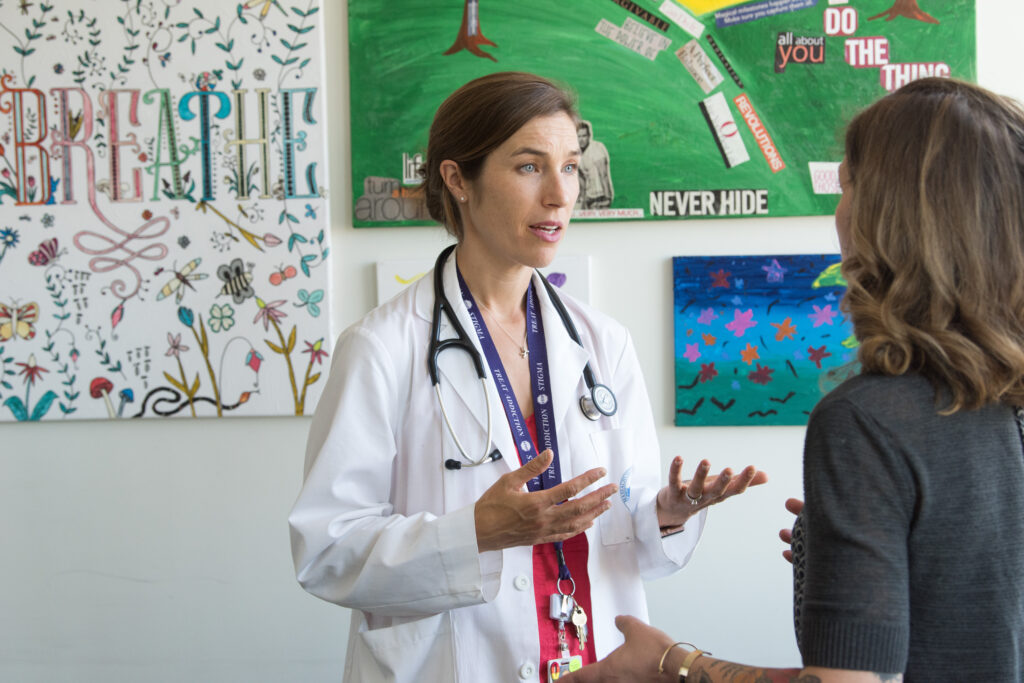Robert Waldinger, MD, is a psychiatrist and psychoanalyst at Massachusetts General Hospital, professor of Psychiatry at Harvard Medical School, a Zen teacher and co-director of the Endowment for the Advancement of Psychotherapy with Carl Marci, MD, a Mass General psychiatrist, scientist and entrepreneur. Here, Dr. Waldinger answers questions about the benefits of psychodynamic (talk) therapy.
Both psychotherapy and meditation are ways of studying the mind.
What is psychodynamic therapy?
It’s the kind of therapy that encourages people to talk in depth about their lives — not just about what’s troubling them, but what they care about the most. Psychodynamic therapy helps people connect their previous experiences with what’s happening now, so that they can see patterns in their lives.
A classic example is the person who fights with every boss they work for. In therapy, the patient may begin to recall memories of a difficult father who constantly demanded blind obedience. The patient may come to realize a pattern of casting every new boss in the role of a ‘dictator’ and in this way accidentally undermining work relationships. Seeing this kind of pattern can be enormously liberating, freeing people to make wiser choices.
You are a Zen teacher. How does that inform your work as a psychotherapist?
Both psychotherapy and meditation are ways of studying the mind. Zen helps us see the difference between the stories our minds create about the world and what the world is really like. The analogy often used is the difference between reading a menu and tasting the food. Our descriptions of the world — for example, a description of the taste of chocolate — cannot begin to do justice to experiencing the real thing.
Recognizing that our stories about our lives are not the whole truth is one way that psychotherapy can relieve suffering. Both Zen and psychotherapy help us see that everything constantly changes, that your current low mood or difficult situation is not going to stay that way — a much-needed perspective when people feel stuck. The truth of impermanence has been especially helpful for me during this pandemic.
Research demonstrates that psychodynamic therapy is very effective — as powerful or more powerful than medication for anxiety and depression.
What is the mission of the Endowment for the Advancement of Psychotherapy?
We train mental health professionals in psychodynamic perspectives and techniques that can inform every area of mental health care. In 2010, I was recruited to Mass General with the express purpose of ensuring that psychodynamic thinking is always taught to our trainees. “So that tomorrow, there will be someone to talk to,” is the Endowment’s motto.
Could you describe the training?
It starts with illustrating very basic premises about how the mind works. Instead of just teaching theory, we use vivid case examples to show students how psychodynamic principles operate both in their own lives and in their patients’ lives. Research demonstrates that psychodynamic therapy is very effective — as powerful or more powerful than medication for anxiety and depression.
Many people who are hurting emotionally end up in a primary care doctor’s office, and some people get medication they don’t need, or surgeries they don’t need. We know that at least half of these doctors’ visits for physical ailments are emotionally based. Many of these problems can be better helped with talk therapy.
What are the challenges involved in the practice of this type of therapy?
Insurance companies are worried that people will linger in psychotherapy forever. But in fact, when people are offered a psychotherapy benefit in their health plan, they do not overuse it, and it reduces other medical costs.
Most people who come for psychotherapy want to get the work done, feel better and get on with their lives. There is a more limited role for long-term psychotherapy, and it can be cost effective in keeping people out of the hospital. A psychiatric hospitalization can cost tens of thousands of dollars. Seeing a therapist once a week or once a month doesn’t cost much at all by comparison.
The lack of parity in insurance reimbursement is one reason why philanthropy is so important.
How can philanthropy make a difference?
Expensive medical procedures are much better reimbursed than primary care visits and psychotherapy. The lack of parity in insurance reimbursement is one reason why philanthropy is so important.
We need support for the training programs and for professional development such as conferences and fellowships in advanced psychotherapy so trainees can take a much deeper dive into these therapeutic techniques. We especially need support for endowed positions to ensure the long-term stability and sustainability of this teaching program.
To learn more about the Endowment for the Advancement of Psychotherapy, please contact us.

The Endowment for the Advancement of Psychotherapy
Overwhelmed, frightened or numbed by unwanted emotions or experiences, more than 16 million Americans every year seek help for emotional problems. For some individuals, it may be all they can do to go to work, care for their children or just get out of bed in the morning.
The mission of the Endowment for the Advancement of Psychotherapy at Mass General is to support and expand education, professional training, and research in dynamic psychotherapy. The Endowment is managed by a board of advisors composed of academics and clinicians dedicated to supporting research, training and public education of psychodynamic oriented psychotherapies.
Your support of the Endowment ensures that resources are available to offer highly effective psychodynamic or talk therapy; advance research in the field; and train clinicians.


